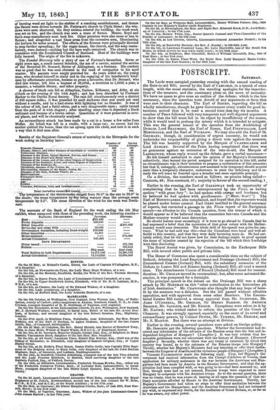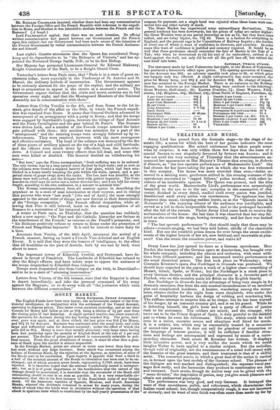POSTSCRIPT.
SATURDAY.
The Lords were occupied yesterday evening with the second reading of the Rate-in-aid Bill; moved by the Earl of CARLISLE, in a speech of some length, with the usual statistics, the standing apologies for the imperfec- tions of the measure, and the customary pleas on the score of necessity. We have no space to give even an outline of the debate; which is the less necessary, since the speeches were devoid of any arguments or facts that were new in their character. The Earl of RODEN, regarding the bill as wholly mischievous, though he gave Government every credit for good in- tentions, moved that it be read a second time that day six months. A number of Peers followed with very temperate and well-digested arguments to show that the bill must fail in its object by insufficiency of the means, while it would tend to prolong the misery which it is intended to mitigate. This was the general tenour of the speeches from the Archbishop of DUBLIN, Lord BEAUMONT, the Earl of ROSSE, Earl F1TZWILLIAM, Lord MONTEAGLE, and the Earl of Wrcur.ow. We may also add the Earl of St. GERMANS; though, in consideration of urgent necessity, he would not undertake the responsibility of giving a direct vote against the measure. The bill was heartily supported by the Marquis of CL.4NRICARDE and Lord AUDLEY. Several of the Peers having complained that there was no guarantee against an extension of the rate-in-aid, the Marquis of LANSDOWNE, whose reply wound up the debate, gave a verbal assurance— He felt himself authorized to state the opinion of her Majesty's Government collectively, that beyond the period assigned for its operation in this bill, under no circumstances was it their intention to propose a continuation of this measure; but that if, unhappily, circumstances now assumed to be temporary should acquire more than a temporary character, endeavours to meet the deficiency and to re- medy the evil must be founded upon a broader and more equitable principle.
On a division, the numbers stood as follows, no proxies being called— Contents, 48; Non-contents, 47 ; majority in favour of the second reading, 1.
Earlier in the evening, the Earl of GALLOWAY took an opportunity of complaining that he had been misrepresented by the Times, as having spoken " with great fury ": he had spoken with energy and loudness, but he believed he had spoken with goodliumour. (" Hear, 'hear!") The Earl of MOUNTCASHEL also complained, and hoped that the reporters would be placed under better control. Earl GREY testified to the general accuracy of reports, but corrected a passage in the Times report of his Navigation speech—an allusion to the Canada question, from the tenour of which it would appear as if he believed that the connexion between Canada and the Mother-country would soon determine.
He should lament most exceedingly if it were to go abroad to Canada that he had expressed a belief that the connexion of that great colony with the Mother- country would soon determine. The whole drift of his speech was quite the con- trary. What he had said was this—that the Canadians were loyal and well-af- fected to this country, and that they were daily becoming more so. He had cer- tainly added, that he did not know how far their feelings might be proof against the sense of injustice created by the rejection of the bill which their Lordships were then discussing.
The Royal Assent was given, by Commission, to the Exchequer Bills Bill, with several other public and private bills.
The House of Commons also spent a considerable time on the subject of Ireland; debating the Land Improvement and Drainage (Ireland) Bill; the Encumbered Estates (Ireland) Bill, with the subsidiary measures of the Defects in Leases Bill and Estates-leasing (Ireland) Bill; all read a second. time. The Attachments Courts of Record (Ireland) Bill stood for reconsi- deration: Mr. GROGAN moved its recommittal; but, after some animated dis- cussion, it was postponed for a fortnight.
The principal speech in the debate on the Drainage Bill was a sharp attack by Mr. HORSMAN on this "other contribution to the bottomless pit of Irish destitution." Mr. CRAWFORD also thought that any hope of bene- fit by the measure was a delusion. But the bill passed without effective opposition, and with approval from some other Members. The Encum- bered Estates Bill received a strong approval from Mr. STAFFORD, Mr. JOHN O'CONNELL, Mr. GROGAN, Sir HENRY BARRON, Sir ARTHUR BROOKE, Mr. SADLEIR, and Mr. KEOGH. Exceptions were taken to it by Mr. NAPIER ; who wished rather to reform the practice of the Court of Chancery. It was strongly opposed, especially on the score of its novel and extraordinary powers, by Colonel DUNNE, Mr. TURNER, Mr. HENLEY, and Mr. S. MARTIN. But there was no attempt at division.
Earlier in the evening, several questions were asked on foreign policy.
Mr. OSBORNE put the following questions. Whether the Government had re- ceived any information of the advance of the Russian army into the free and in- dependent kingdom of Hungary ? (Laughter.) It was very evident that ho- nourable gentlemen were not conversant with the history of Hungary. (Renewed laughter.) Secondly, whether there was any treaty in existence by which this country was bound, as to the entrance of the Russian troops into Hungary ? Thirdly, whether her Majesty's Ministers had any intention to offer their media- between the Emperor of Austria and the victorious people of Hungary ? (Laughter.) Viscount PALMERSTON made the following reply. First, her Majesty's Go- vernment had received information from the Chargé d'Affaires at Vienna, that application for military assistance in the war between the Austrians and Hun- garians had been made by Austria to the Russian Government, and that the ap- plication had been complied with, or was going to be—had been assented to; and that, though none had as yet entered, Russian troops were expected to enter Hungary to cooperate with the Austrian troops. As to the second question, there was no treaty, that he was aware of, bearing at all upon the question of that mi- litary assistance afforded by Russia to the Austrian Government. Thirdly, her Majesty's Government had taken no steps to offer their mediation between the Austrians and the Hungarians; and the Austrian Government had not intimated any wish, or expressed any desire, for the mediation of Great Britain, or, as far as he was aware, any other power. Mr. BALL. LIE COCDBANE inquired, whether there had been any communication between the Foreign Office and the French Republic with reference to the expedi- tion to Rome, and whether it was intendedto mediate between the French aW the Bomana ? (A laugh.)
Lord Parauntivros replied, that there was no such intention. No official written communication had passed between our Government and the French upon this subject; but our Government had been made aware of the intention of the French Government by verbal communication between the French Ambassa- dor and himself.



























 Previous page
Previous page